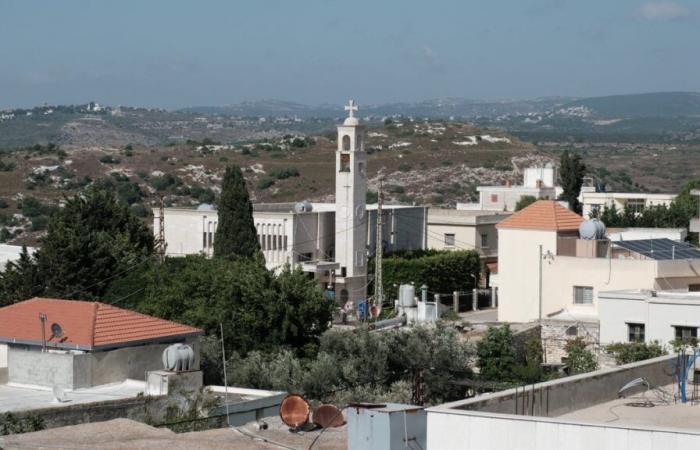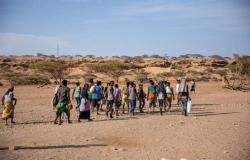“The agreement between Israel and Hezbollah will not change anything. […] The only solution that can prevent the return of the Shiite enemy is Jewish colonization.” At the beginning of December, when the Israeli army was accused by France of having violated the ceasefire in Lebanon, concluded on November 27 between the Hebrew state and the Islamist organization, on around fifty occasions. Shiite, the Jewish messianist movement named “Uri Tzafon”1 – The term “Uri Tzafon”, which can be translated as “Awake, O North”, comes from a passage from the Song of Songs (4:16), a book common to the Christian and Hebrew versions of the Bible . In French, it is translated into “Rise, aquilon!”, a literary synonym for the north wind. 1 (“Rise, O North” in French) still affirmed on his WhatsApp group the need for Israel to colonize the region.
Since the creation of Israel in 1948, several messianic movements have called for the colonization of Lebanon south of the Litani River, an area they claim as part of the “Promised Land.” With a cedar tree surrounded by the Star of David as its emblem, Uri Tzafon has gathered several thousand followers since the spring of 2024 and maintains that the colonization of Lebanon would be both a security necessity – a means of“grant genuine and stable security to northern Israel”according to press releases published on his WhatsApp group – and a messianist quest for “to recover” the territory.
Subscribe to the Slate newsletter for free!Articles are selected for you, based on your interests, every day in your mailbox.
Uri Tzafon is a nationalist movement “the origins of Zionism” and who “consider the Bible as a land register”indicates Karim Émile Bitar, professor of international relations at Saint-Joseph University in Beirut and researcher at the Institute of International and Strategic Relations (IRIS). “With the arrival of ultranationalists within the Israeli government, openly in favor of colonization, these messianist currents are becoming more and more vocal, particularly on the colonization of the Gaza Strip and for certain [comme Uri Tzafon, ndlr] on the colonization of South Lebanon”observes this Middle East specialist.
“This land belongs to Israel and the Jews”
“Attention! This land is that of Israel, it belongs to the Jews. You are asked to evacuate it immediately.” During the month of June, it was through drones and balloons in the skies of southern Lebanon that these messages, written in Arabic, reached the inhabitants of the area, thus threatened with expulsion.
In recent weeks, a new small group of Israeli settlers has appeared in the far-right Jewish messianic movement. On the Uri Tzafon website, its members, for example, distribute advertising offers offering a modern house to Israeli reserve officers in southern Lebanon, real estate projections which provoke an outcry on social networks.
Founded in April 2024, the Uri Tzafon movement’s mission is to drive the colonization of the region in the midst of the war between Israel and Hezbollah. At the group’s inaugural conference, Yoel Elitzur, a linguist and professor of biblical theology at the Hebrew University of Jerusalem, called Hamas’s October 7 attack a “obvious miracle” and of “divine message”. In other words, according to him, it is an unexpected opportunity to colonize the Gaza Strip and southern Lebanon.
In mid-November, the Jerusalem Post, the most widely read English-language daily in Israel, went so far as to relay a call for the colonization of Lebanon through the pen of Michael Freund, former deputy director of communications and political planning under the Prime Minister. mandate of Israeli Prime Minister Benjamin Netanyahu (1996-1999). “Historically speaking, southern Lebanon is actually northern Israel and the roots of the Jewish people in the region run deepwe can read in this column. […] Indeed, in biblical times, southern Lebanon was clearly part of the land of Israel. In the book of Genesis (10:19) it is written: “The territory of the Canaanites extended from Sidon to Gerar to Gaza, then to Sodom and Gomorrah, Admah and Seboim to Lesha.” Sidon, a city in southern Lebanon, is halfway between the current Israeli border and Beirut.
Although it remains in a very minority within Israeli opinion, the movement is increasingly worrying in Lebanon. On November 20, Israeli “researcher” Zeev Erlich, aged 71, was killed in the south of the country, while investigating an ancient fortress with the Golani brigade of the Israeli army. “The stated purpose of entry [de Zeev Erlich] in the sanctuary of the prophet Shimon in the city of Shamaa was the search for historical evidence related to the land of Israel”said the Lebanese Minister of Culture in a press release, accusing Israel of wanting “occupy the land, history and heritage of Lebanon, if it finds the means to do so”. According to the center-left Israeli daily Haaretz, Zeev Erlich was invited by the Israeli army to “evaluate a fortress” that the IDF planned to “transform into an observation post”.
Lessons from the West Bank
The settlers “have already proven that in Israel, today’s delusions are tomorrow’s politics”the Haaretz newspaper was also worried in June (also officially boycotted since the end of November by the government of Benyamin Netanyahu). And the Israeli opposition daily draws a historical parallel with the first settlers installed in the Palestinian territories – especially in the West Bank – during the 1970s and 1980s, who then accomplished a “distant dream” which still seemed impossible to them.
Today, according to a report from the United Nations High Commissioner for Human Rights published in February 2024 and citing figures from the Israeli NGO Peace Now, nearly 700,000 Israeli settlers live illegally in the occupied West Bank, including approximately 230,000 in East Jerusalem, in violation of international law. This concern is also raised by Karim Émile Bitar, who draws a parallel with the progression of official speeches by the Israeli authorities. “We are increasingly mobilizing the idea of a “vital space”, that is to say the idea that Israel could have the need to expandenlightens the researcher at IRIS. So as the messianist currents progress and the currents ofestablishment military develop this theory of the need for a vast buffer zone for the Jewish state, there is a risk that the territorial integrity of Lebanon will be threatened.
In 1982, in the midst of the Israeli invasion of Lebanon to neutralize the Palestine Liberation Organization (PLO) in the territory, small Orthodox groups demanded the annexation of the south of the country of Cedar. At the time, around 20,000 settlers lived in the occupied West Bank and Gaza Strip. Their political influence on the Israeli government is then derisory. Created in 1974, the far-right messianic movement Gush Emounim (or “Block of the Faithful”) pushed for the installation of the first colonies in the occupied West Bank and linked its religious territorial claims to southern Lebanon, by asserting the biblical story of tribes of Asher and Naphtali – two of the famous twelve tribes of Israel – who are said to have lived in the region.
Their demands went unheeded by the authorities. But since then, Israel’s policy has changed a lot. And the West Bank settlers, once isolated, now receive active support from the government. Leader of the nationalist and religious Zionist party Mafdal (or National Religious Party), classified on the extreme right, Bezalel Smotrich, Minister of Finance in the current government of Benyamin Netanyahu, is today especially strong in his administration in charge of the occupied territories of West Bank. Because their supervision, previously military, has now passed to civilian.
If the Uri Tzafon movement is still in the ultra minority in public opinion, members of Likud, the party of Prime Minister Benjamin Netanyahu, are still pleading for Israel to maintain control over the region by occupying it. In October 2023, the independent investigative magazine +972 (for which Israeli and Palestinian journalists collaborate) revealed documents from the former Israeli Ministry of Intelligence – dissolved in March 2024 – which planned an occupation then an expulsion of Palestinians from the Gaza Strip, to allow the annexation of the territory, a scenario still unthinkable before the attacks of October 7.
“The current border between Israel and Lebanon is untenable. […] Israel must occupy southern Lebanon to ensure the security of Israelis living in northern Israel.supported among others Ariel Kallner, member of the Knesset and Likud, in an interview given to the right-wing Israeli newspaper Maariv, on September 15, 2024. These territorial aims are all the more worrying since Bezalel Smotrich promised, on November 11 , the annexation of settlements in the West Bank in 2025, rejoicing at the return of Donald Trump at the head of United States to support this violation of international law and the burial of a two-state solution.






